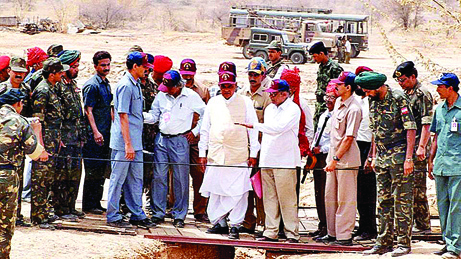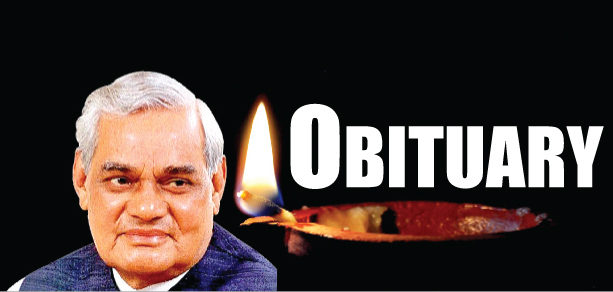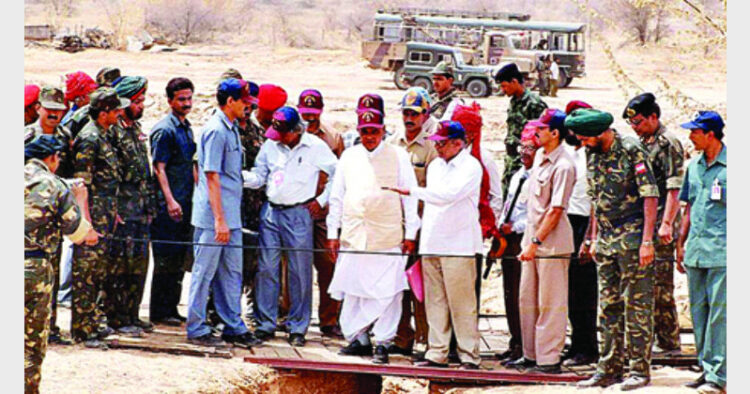Leaders like Atal Behari Vajpayee do not fit into stereotype definitions. They define leadership
Seshadri Chari

Atal ji at the Pokhran test range after Bharat successfully tested the nuclear bomb
T he history of BJP’s ascendancy to power will never be complete without the mention and assessment of one individual Atal Behari Vajpayee, an institution in himself. In Parliament and outside, in prose and in poetry, in domestic and in foreign affairs, his indelible stamp is the guiding spirit for the party poised to meet the challenges.
Atal ji’s very first speech in Parliament on India’s foreign policy was a great hit. His chaste Hindi speech was so impressive that the then Prime Minister Pandit Nehru sought the permission of the Speaker and spoke in Hindi, thanked Vajpayee for supporting his foreign policy and also appreciated his comments. According to one author Pt Nehru arranged for the inclusion of Vajpayee in the team representing India in the United Nations. Right from his entry into Parliament, Vajpayeeji won the acclaim of senior members by his thought provoking speeches and wit, repartee and humour. Veteran Parliamentarian Ananthasayanam Ayyangar had commented that it is a treat to hear Vajpayee in Hindi.
Even at the height of political power as Prime Minister, his unwavering faith in the cadre and total loyalty to the party is evident in his speeches
After the Jana Sangh opposed some of the populist policies of the Congress like bank nationalisation and abolition of privy purses, Smt Indira Gandhi labelled the party as “baniye” party (party of traders). Vajpayeeji who took notice but did not want to get into a serious spat retorted back saying Smt Gandhi’s Hindi is to be blamed. “We also say Jan Sangh ke sadasya baniye (become members of the Jan Sangh) and Smt. Gandhi is actually repeating what we say”. That was the end of it.

But Vajpayee never hesitated in supporting a national cause even if it demanded applauding his political adversary. When the first Pokhran nuclear test was conducted, the Jan Sangh was a bitter critic of Smt Gandhi’s policies. But Vajpayee led his party in congratulating the government for this bold step. He even held the view that the first Prime Minister Nehru was a visionary who realised the importance of nuclear science and founded one of the world-class nuclear establishment under the leadership of Homi Bhabha. It is unfortunate that he never received the same pat on his back from the Congress when he conducted Pokhran-II.
Very often Atalji was praised for his political accomplishments, candid views and success with a rather loaded compliment that ‘he is the right man in the wrong party’. But he accepted this pat on his back more as a ‘left handed compliment’. Even at the height of political power as Prime Minister, his unwavering faith in the cadre and total loyalty to the party is evident in his speech made some time in 2000 wherein he said, “The BJP has gained its present strength as a result of our collective efforts. We have seen many a success that have been preceded by many tears, sweat and at times even blood of our cadres. We have entered a crucial phase in our journey. Our acceptability has enhanced, it will enhance further. This is because we are different and we speak a language which strikes a chord with the people. We must endeavour to maintain the uniqueness as a party. Our political behaviour will determine this”.
But he did not hesitate to warn the party and the cadre at the same time. In the same speech he continued saying, “The crucial question we face is `what after this political success?” We are in power at the Centre and in several States. We have to concentrate on improving the quality of governance. In governance we must concentrate on serving the people while keeping our national interests paramount.”
For a Parliamentarian whose political career began in 1957, Vajpayee is witness to many ups and downs not only in his personal life but in the life of his party and the country. At the first annual session of the Punjab State Jan Sangh in 1952 attended by Dr SP Mookerjee and Pt Prem Nath Dogra, president of Jammu Kashmir Praja Parishad, the young “Pracharak” Vajpayee was the last speaker. (Incidentally after his speech which almost ended at midnight, Vajpayee and couple of other workers went hunting for dinner on the cold night but had to settle with just a cup of tea at a roadside stall).
On another important and sensitive issue of Uniform Civil Code he was equally forthcoming in articulating the views of the then Jan Sangh. In one of the speeches in Parliament in 1961 he said, “Constitution says there should be a common civil code. Why then is a separate law made for marriage for Hindus and Muslims? Should marriage laws be different for each community? Is bigamy bad in Hinduism and good for Islam? How can a rule be applicable to one and not to the other? The Government recently set up a commission inquiring into misuse of Hindu temples and mutts. I welcome it, but do you think churches and mosques are not misused? Why no law has been brought in for this? When a state is concerned, everyone is the same”.
Prime Ministers are never alone but probably lonely in office. Vajpayee was no exception and he even expressed this in his poems. But he chose his friends and colleagues, albeit very few of them, very carefully. His immediate team had the trio of Advani, Jaswant Singh and Brajesh Mishra. After the Pokhran-II Nuclear tests in May 1998, US, literally caught napping, was extremely upset and punished India with sanctions. Vajpayee, who probably knew of the US reaction, was firm in his resolve but also realised the importance of Indo-US partnership. His acumen of choosing the right person for the right job came handy when he asked the suave and soft-spoken Jaswant Singh to salvage the situation, knowing well his equation with Clinton administration’s points man Strobe Talbott. The US sanctions withered away. Such was the wisdom of this seasoned leader that he weathered many a storms with great confidence and in his own inimitable style.
Post 1970, the most turbulent period in the political history began with the emergence of anti-Congress politics, gaining strength after the railway strike and the JP movement against Congress corruption. The opposition found a new voice in Vajpayee and the then English daily Motherland became the voice of the united opposition. Vajpayee became the prime attraction in all JP rallies. But soon after that the infamous Emergency was imposed and the rest is history.
During his incarceration in Bangalore jail Atalji developed medical problems. He had to be operated for appendicitis but later brought to AIIMS for prolapsed disc. Even as he endured extreme back pain he refused to seek freedom from detention. In his inimitable style he quipped, “hum toot sakte hain jhuk nahi sakte” (we can brake but cannot bend). This was the mood of the person, his party, his cadre and his country. Leaders like Vajpayee do not fit into stereotype definitions. They define leadership.
(The writer is former editor of Organiser and edited a pictorial biography on
Vajpayee, Jananayak)














Comments